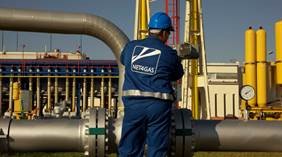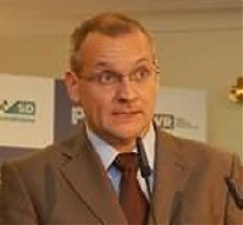Energy
International Internet Magazine. Baltic States news & analytics
Wednesday, 04.03.2026, 20:26
Czech NS2 support ‘tough luck’ for Poland – Bartuška
 Print version
Print version |
|---|
| Czech pipeline infrastructure. The country has a favourable stance towards the Nord Stream 2 expansion. (Net4gas) |
Speaking
to Interfax Natural Gas Daily, Václav Bartuška, ambassador-at-large
for energy security in the Czech Republic since 2006, explains why the country
will not be joining Poland in opposing Nord Stream 2 and gives his reasons why
the Stork II Polish/Czech interconnector has been subject to repeated delays.
Interfax Natural Gas Daily: There are several issues that Poland and the Czech Republic seem to have different positions on, including the Stork II interconnector, which is featured on the list of EU Projects of Common Interest. Last year, neither country submitted a bid for EU’s Connecting Europe Facility (CEF) programme. Is the Czech Republic still interested in this pipeline?
Václav Bartuška: We are; it’s been in our energy strategy for many years. We already have one small interconnector with Poland, opened in 2011, which helps to supply Poland’s southern regions. It’s basically one-way because there’s low pressure on Poland’s side. The Stork II is something my government wants to have, but the ball is in Poland’s court. I doubt if Warsaw is equally eager to build it.
The situation is that in 2015 the European Commission decided to allocate a grant of €63 million ($69 million) for Stork II from the CEF programme. But last June, out of nowhere, the Polish government suggested the commission should postpone this project from 2019 to 2022 or even later. The Baltic Pipeline – a much less advanced idea for receiving gas from Norway – seemingly became Poland’s new priority. Due to the change of the timeline the funding given in 2015 has been withdrawn.
INGD: Tomasz Pietrasienski, spokesperson for Poland’s transmission system operator Gaz-System, has said it was the Czechs who put the brakes on the 2016 bid. He claimed it was not submitted because of "regulatory difficulties" on the Czech side.
VB: It’s really hard to understand what’s going on. From what I know, Poland’s government simply doesn’t want to have this interconnector as it would provide an entry point into Poland for Russian gas from Germany. However, in the same time Poland applied for the funding for the Polish-Slovak interconnector. I’m wondering what sort of gas, other than Russian, is going to come through this pipeline? We don’t really know what is happening.
 |
|---|
| Václav Bartuška. (Martin Mach Ondrej) |
INGD: But eventually, you agreed on the change to the timeline. Last autumn, the prime ministers of the two countries signed an agreement on their willingness to go ahead with the project.
VB:
Yes, but Poland still owes us an explanation for why the original version was
cancelled.
INGD: Maybe
because Poland is disappointed with Czech support for Russia-backed Nord Stream
2, which is seen as a geopolitical challenge by many. Warsaw has even
introduced diplomatic efforts to block this initiative.
VB: At
the moment, we’re not a part of Nord Stream 2. The pipeline would go from
Russia to Germany. But, of course, if there is a connection from Germany
onwards, it will reach our country too. We don’t get this anti-Russia rhetoric,
as the whole logic of the common EU market is that when Russian gas crosses EU
border, it’s no longer Russian, nor Norwegian nor Algerian. It’s simply gas
that is measured by its economic value. We find it a safe resource.
Honestly,
if Poland has a problem with that – tough luck. Our interest is to have as many
pipelines with our neighbours and as many gas sources as possible. We already
buy gas from Russia, Norway and the German exchange, while the price has been
for many years decided at the northwestern gas hub in Rotterdam. We have
learned that having a bunch of interconnectors only helps the market in getting
a better price from the suppliers. Poland’s approach seems to be slightly
different.
INGD: The
principal reason for the Czech Republic to invest in Stork II was to get access
to the Polish LNG terminal in Swinoujscie. Is it still on your agenda?
VB: We
have no interest in specific places. If any additional volumes of gas will reach
the market from Swinoujscie that’s fine with us. We’ll welcome any gas coming
to Europe, whether it’s LNG from Qatar, the United States or Australia, or
natural gas from Azerbaijan. All of that would make the price better for the
customer.
Honestly,
it should be of more interest to the sellers than the buyers. Europe is by far
the biggest and the most predictable gas market in the world, and the Czech
Republic has full access to Western European markets. We’re well-connected, our
domestic market and infrastructure are well-developed, and thus thankfully we
have many other options than Poland’s LNG.








 «The Baltic Course» Is Sold and Stays in Business!
«The Baltic Course» Is Sold and Stays in Business!

